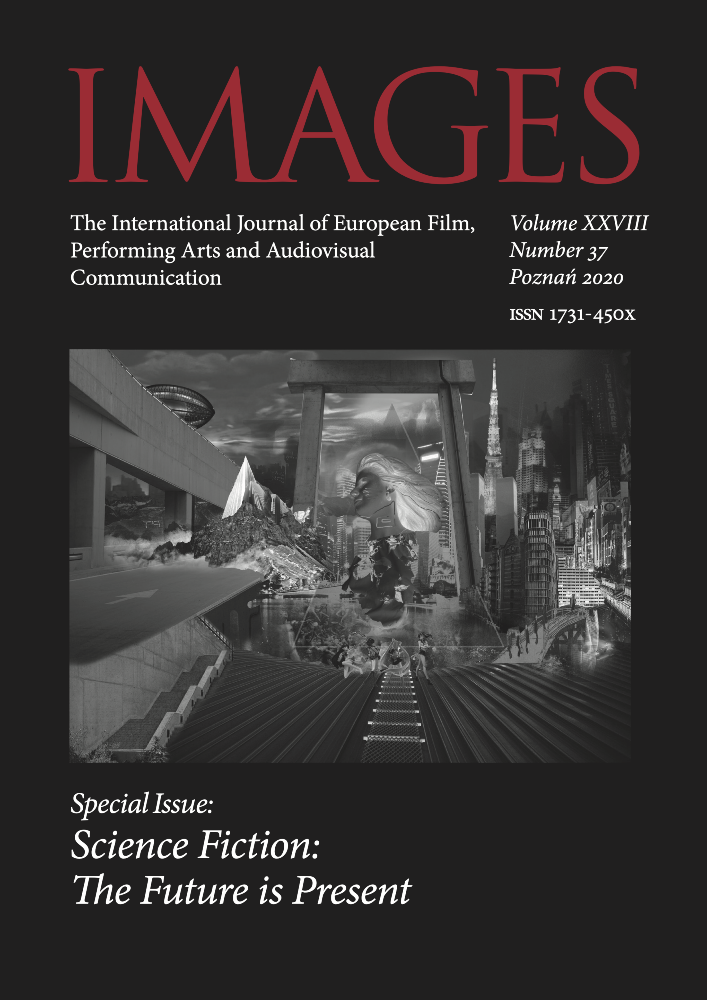Abstract
David Avidan’s Message from the Future (1981) is one of few Israeli science fiction films ever made. This ambitious project of the well-known avant-garde poet has been forgotten for many years, as a result of a financial and artistic failure of the movie. The paper shows Avidan’s doomed film as an interesting cultural text that can be read as the director’s commentary on the Israeli reality of his time. Contrary to the artist’s claims about the global ambitions of the picture, Message from the Future is immersed in the local, exploring it under the guise of narrative structures borrowed from Hollywood. The text analyzes a precise deconstruction of the plot patterns characteristic for the classic American SF films from the 1950s, which Avidan adjusted to the Israeli sociopolitical landscape at the turn of the seventies and eighties.
References
Almog O., The Sabra. The creation of the New Jew, Berkeley, Los Angeles, London 2000
Ariel N., How to do things with futurism: Traces of futurism in Hebrew culture, “Modernism/Modernity” 2020, vol. 27, no. 1, pp. 1–26
Avidan D., Message from the Future, [in:] Futureman, transl. by T. Keller, Los Angeles 2017, pp. 135–136
Ben-Yehuda N., Hebrew SF, [in:] Anatomy of Wonder. A Critical Guide to Science Fiction, ed. by N. Barron, New York, London 1987, pp. 577–582
Ben-Yehuda N., Sociological reflections on the history of science fiction in Israel, “Science Fiction Studies” 1986, vol. 13, no. 38, pp. 64–78
Cohen A., The Worst-Kept Secret: Israel’s bargain with the bomb, New York 2010 Crawley T., Message from the Future, “Starburst Magazine” 1981, vol. 4, no. 3, pp. 16–18
Dahan Y., The films of Israeli poet and enfant terrible David Avidan, 2019, <https://mubi.com/notebook/posts/the-films-of-israeli-poet-and-enfant-terrible-david-avidan>, accessed: 17.03.2020
Eshed E., Ha-Ish Sheba Mehatid, 2000, <https://www.sf-f.org.il/sf-f/old_site/story_33.html>, accessed: 2.01.2020
Farr W.D., The Third Temple’s Holy of Holies. Israel’s Nuclear Weapons, Montgomery 1999
Gabbard K., Religious and political allegory in Robert Wise’s: “The Day The Earth Stood Still,” “Literature/Film Quarterly” 1982, vol. 10, no. 3, pp. 150–153 Hendershot C., Paranoia, the Bomb, and 1950s Science Fiction Films, Bowling Green 1999
Kaplan E., Projecting the Nation. History and Ideology on the Israeli Screen, New Brunswick 2020
Klein U., Our best boys: The making of masculinity in Israeli society, [in:] Male Roles, Masculinities and Violence: A culture of peace perspective, ed. by I. Breines, R. Connell, I. Eide, Paris 2000, pp. 163–180
Kozlovic A.K., Robert Wise’s The Day the Earth Stood Still Part I: A Religious Film?, “Kinema” 2013, no. 40, pp. 4–30
Kozlovic A.K., Robert Wise’s The Day the Earth Stood Still (Part II), “Kinema” 2014, no. Spring
Kozlovic A.K., Robert Wise’s The Day the Earth Stood Still (Part III), “Kinema” 2014, no. Fall
Kronfeld C., Harshav’s Likrat: Toward a new poetics and politics of the “Statehood Generation,” “Dibur Literary Journal” 2016, no. 2, pp. 90–97
Manor G., Mada Bizyoni, “Al HaMishmar”, 10.09.1981, p. 6
May A., Rockets and Ray Guns: The Sci-Fi Science of the Cold War, Crewkerne 2018 Nativ T., Avidan Magiya Min haatid, “Davar”, 13.02.1981, p. 21
Nicholls P., The World of Fantastic Films, New York 1984
O’Donnell V., Science ficton films and Cold War anxiety, [in:] Transforming the Screen 1950–59, ed. by P. Lev, New York 2003, pp. 169–195
Omry K., Israeli SF 101, “SFRA Review 2013, no. 306, pp. 8–11
Pinsker S., Hebrew literature, [in:] The Cambridge History of Judaism. Volume VIII: The Modern World, 1815–2000, Cambridge 2017, pp. 755–776.
Seed D., American Science Fiction and the Cold War. Literature and film, Chicago, London 1999
Shapiro J.F., Atomic Bomb Cinema. The apocalyptic imagination on film, New York 2002
Shippey T., The Cold War in science fiction, 1940–1960, [in:] Popular Culture: Past and Present, ed. by B. Waites, T. Bennett, and M. Graham, London, New York 1982, pp. 308–322
Shohat E., Israeli Cinema. East/West and the Politics of Representation, London, New York 2010
Sontag S., The imagination of disaster, [in:] Hibakusha Cinema. Hiroshima, Nagasaki and the Nuclear Image in Japanese Film, ed. by M. Broderick, New York 2009, pp. 38–53
Teitelbaum S., Israel, [in:] The Encyclopedia of Science Fiction, ed. by J. Clute and P. Nicholls, New York 1993, pp. 629–630
Teitelbaum S., Lottem E., Introduction, [in:] Zion’s Fiction: A Treasury of Israeli Speculative Literature, ed. by S. Teitelbaum and E. Lottem, Simsbury 2018 Vogel A., Film as a Subversive Art, New York 2005
Wagner M., Recipe for an Israeli nuclear arsenal, “Middle East Report” 1986, no. 143, pp. 8–12, 14–15.
Weisman A., David Avidan: The sadosemantic Poet, [in:] Futureman, ed. by T. Keller, Los Angeles 2017, pp. 9–23
Weisman A., The Poet as Entrepreneur: The Case of David Avidan, “Dibur Literary Journal” 2018, no. 5, pp. 21–30
License
Copyright (c) 2020 Maciej Pietrzak

This work is licensed under a Creative Commons Attribution 4.0 International License.

